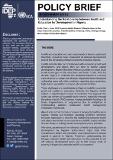| dc.description.abstract | On the theoretical level, the general conception of the book is based on the Pareto principle of optimum welfare. The frame of reference is "capitalistic", that is, the economic mechanisms are studied in the context of the capitalist system as it is. Furthermore, the contradictions implied by the division of society into different classes each with its particular interests are ignored. In short, the book takes care not to state specifically for whom the environment policies really intended. This enables us to take as assumptions underlying the analysis: the homogeneity of the social group; the representatives of the state as a representative of the general interest. If these assumptions are accepted, what are the problems of environmental economies? What is the best method to be used in solving these problems? Who is to finance such a policy? Who is to promote it? What are the repercussions from the international point of view? The very problematic of this book enlightens us as to its aim. while noting the inadequacies of the market economy it does not in any way attempt to question that economy but to perfect it. | en |
| dc.title | Problems of environmental economics:a critical study | en |
| uneca.subject.fulltaxonomy | UNBIS::NATURAL RESOURCES AND THE ENVIRONMENT::ENVIRONMENT::ENVIRONMENTAL ECONOMICS | en |
| uneca.subject.fulltaxonomy | UNBIS::NATURAL RESOURCES AND THE ENVIRONMENT::ENVIRONMENT::ENVIRONMENTAL ECONOMICS | en |
| uneca.subject.fulltaxonomy | UNBIS::NATURAL RESOURCES AND THE ENVIRONMENT::ENVIRONMENT::ENVIRONMENTAL ECONOMICS | en |
| uneca.subject.fulltaxonomy | UNBIS::NATURAL RESOURCES AND THE ENVIRONMENT::ENVIRONMENT::SUSTAINABLE DEVELOPMENT | en |
| uneca.subject.fulltaxonomy | UNBIS::NATURAL RESOURCES AND THE ENVIRONMENT::ENVIRONMENT::SUSTAINABLE DEVELOPMENT | en |
| uneca.subject.fulltaxonomy | UNBIS::NATURAL RESOURCES AND THE ENVIRONMENT::ENVIRONMENT::SUSTAINABLE DEVELOPMENT | en |
| uneca.subject.fulltaxonomy | UNBIS::ECONOMIC DEVELOPMENT AND DEVELOPMENT FINANCE::DEVELOPMENT::ECONOMIC DEVELOPMENT | en |
| uneca.subject.fulltaxonomy | UNBIS::ECONOMIC DEVELOPMENT AND DEVELOPMENT FINANCE::DEVELOPMENT::ECONOMIC DEVELOPMENT | en |
| uneca.subject.fulltaxonomy | UNBIS::ECONOMIC DEVELOPMENT AND DEVELOPMENT FINANCE::DEVELOPMENT::ECONOMIC DEVELOPMENT | en |
| uneca.subject.fulltaxonomy | UNBIS::GEOGRAPHICAL DESCRIPTORS::AFRICA | en |
| uneca.subject.fulltaxonomy | UNBIS::GEOGRAPHICAL DESCRIPTORS::AFRICA | en |
| uneca.subject.fulltaxonomy | UNBIS::GEOGRAPHICAL DESCRIPTORS::AFRICA | en |
| uneca.creatorCorporate.fulltaxonomy | Corporate Authors::United Nations. Economic Commission for Africa. African Institute for Economic Development and Planning(IDEP) | en |
| ags.creatorCorporate | United Nations. Economic Commission for Africa. African Institute for Economic Development and Planning(IDEP) | en |
| ags.subjectClassification | 03.03.00 ENVIRONMENT | en |
| ags.descriptionNotes | A Critical Study | en |
| ags.publisherPlace | Dakar | en |
| ags.publisherName | UN. IDEP | en |
| dc.date.accessioned | 2019-08-22T11:35:16Z | |
| dc.date.available | 2019-08-22T11:35:16Z | |
| dc.date.issued | 1974-06 | |
| dc.identifier.uri | https://hdl.handle.net/10855/42623 | |
| dc.format.extent | 49 p. | |
| dc.language | eng | |
| dc.type | Working paper | |
| uneca.workflow.processed | true | |
| ags.creatorPersonal | Sow, Samba | |
| ags.availabilityNumber | 1974 | |
| ags.availabilityNumber | b11953597 | |
| ags.availabilityLocation | IDEP | |
| ags.rights.termsofuse | public | |
| ags.RN | R/2619-rev.1 | |
| ags.JN | b11953597 | |
| uneca.language.supported | en | |




